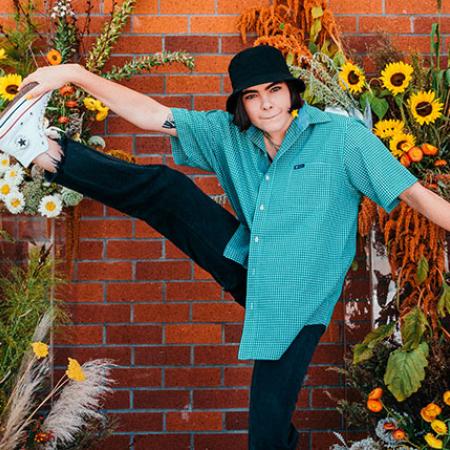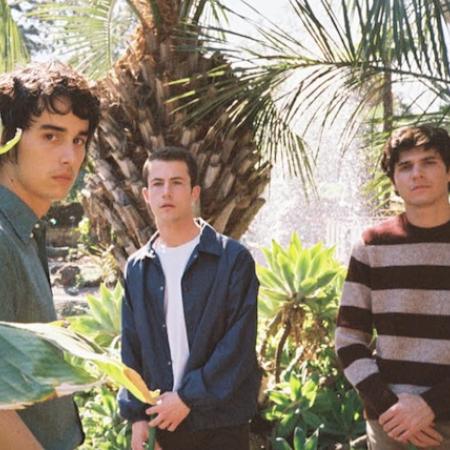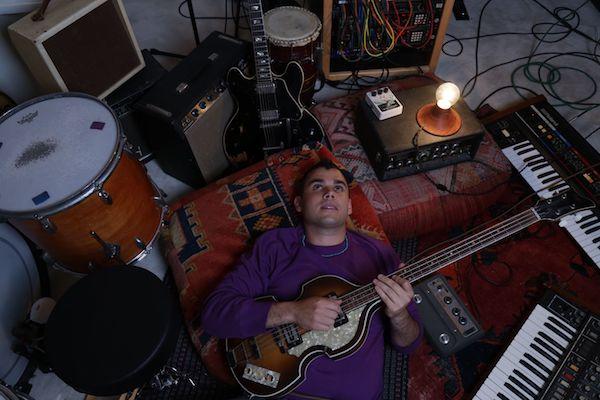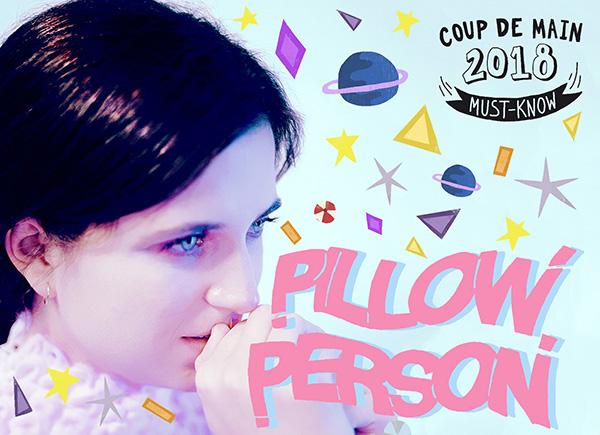Foals frontman Yannis Philippakis chuckles down the phone-line on a late night call from London, "Thank you! That’s nice to hear. I think it might be mine too," agreeing that the band's new album just might be their best yet. Out today, 'Everything Not Saved Will Be Lost - Part 1' precedes a promised second part expected later this year in Spring (/UK Autumn), and arrives guns blazing - sounding off dystopian alarm bells, personifying a universal relatable neurosis, and fretting over the deterioration of meaningful communication in this modern age.
We caught up with Philippakis recently ahead of the release of the new Foals album to discuss the importance of optimism in these modern times, Pidge the Cat, and exactly when the band will be returning to New Zealand...
...one of the background preoccupations is about this idea of other people, and about how quite quickly we seem to have descended into a place where ‘the other side of society’ or ‘the other person’ has become a much bigger and more difficult subject - one in which communication has become increasingly fraught.

COUP DE MAIN: In 2015, you mailed us a postcard from London on which you wrote a promise that you'd see us soon. It's now 2019 and we haven't seen you in New Zealand since 2013, Yannis! When are you going to make this right?
FOALS - YANNIS PHILIPPAKIS: <laughs> Good question! We’re gonna come back soon I think, hopefully this year. The chances are good for this year.
CDM: I'll never forget that 2013 show, I think you fought with security guards twice when they tried to stop you from jumping off a second-story balcony into the crowd.
YANNIS: Yeah, I remember that show. I really liked being in New Zealand, I wish we’d come back sooner. We can make up for it next time we come back! I’ll get to jump off the balcony.
CDM: Before we talk about your new album, I have a very important question for you: Why is there a photo of Jack's cat Dracula on the Exits 7" vinyl single and not your cat Pidge? Justice for Pidge!
YANNIS: Okay, so, actually, the thing is that the packshot of the deluxe edition shows Dracula, but on the other side is an absolutely fantastic photo of Pidge! So fear not, she hasn’t been overlooked.
CDM: Okay, I forgive you now. I get it, you're waiting for a grand reveal.
YANNIS: Yeah. Pidge actually hasn’t been very well recently.
CDM: Oh no! Is she okay?
YANNIS: Yeah, she’s getting better, but she’s had some kidney issues so it was a little bit touch and go for a minute, but she’s doing a lot better. It’s important for us to immortalise our cats on vinyl, I think.
CDM: Now I'm really worried about Pidge!
YANNIS: No, no, no, she’s fine! She’ll be okay.
CDM: Last time we spoke, you mentioned that you wrote 'What Went Down' quicker than past albums. What was it like writing 'Everything Not Saved Will Be Lost'?
YANNIS: It was longer than past albums, which is kind of what we wanted. I think the main desire this time around was to have space and time to really work into the tracks, and then also have time to live with them and not make hurried decisions. I think that the way that we set it up was all designed for that, so we worked without a producer so nobody could hurry us along, we recorded in our neighbourhood studio so we could walk there and it felt comfortable and it was cheap. So we never kind of felt any pressure - there was never any parameter on the process. I think all of that has fed into the sound of the record and the sound of the songs, but also the fact that there’s that much material that we can have these two albums coming out.
CDM: You've described the two new albums as "two halves of the same locket" - in what ways do they fit together or complement each other?
YANNIS: I think when we were in the latter stages of recording we felt that there was a symmetry to some of the material - a symmetry, but also a kind of an opposite-ness to it. So we were concerned about the material being able to form a cohesive whole in one album, and also we saw that there were these kind of different threads in it, so it became clear that we needed to do two records. Thematically they’re similar - like, lyrically the same preoccupations are there, but musically they’re slightly different. I think album one is slightly more textural, it’s more dance-y, it has more space in it. Album two is slightly more guitar-driven. They complement each other - to me they have different colour palettes in a way; number one is kind of a red record, and album two in more of an orange record in a way. So they have their own distinct qualities, but I feel that everything becomes clear once you hear album two, if that makes sense.
CDM: True or false: The album title 'Everything Not Saved Will Be Lost' comes from the Nintendo Quit Screen?
YANNIS: Yeah, partially true - I thought that it came from the Nintendo screen, it’s something that I came across on the internet and at first I kind of just dismissed it as like, 'This is a simple phrase,' but it was a phrase that kind of just hung around in my mind. I felt like it would recur in my thoughts, and particularly when we were thinking about titling the album I just thought that in many ways this statement sums up a lot of the concerns and a lot of the themes of the album. So on one level, yeah, it’s just a computer warning that apparently comes from Nintendo and is just meant as a basic action, but the thing that I kind of fell in love with was this deeper meaning to it.

CDM: Do you consider 'Exits' to be a glass-half-full or glass-half-empty song?
YANNIS: <laughs> That’s a good question. I guess it’s glass-half-full. I was about to say the opposite, but actually when I think about it, I think that it’s offering this new way of life that’s below ground and there’s like a romance to that. There’s something magical about that, and I don’t wanna be a bummer, so nothing should be glass-half-empty.
CDM: In your Q Magazine interview you mentioned that you'd been reading about tech billionaires buying bunkers in New Zealand. I had no idea. So thanks for that information about my own country.
YANNIS: Oh yeah, buying land up.
CDM: Seeing as how Donald Trump doesn't think that climate change is real, how do you think he would feel about your song 'Exits'?
YANNIS: Aha! I would hope that he didn’t like it!
CDM: I really like the segue between the new album's opening-track 'Moonlight' and 'Exits'. Did you do that deliberately?
YANNIS: Yeah, we did that deliberately. ‘Moonlight’ is kind of a strange piece of music, it was probably the first thing I wrote for the new record. We passed it for a while, and there was a long period of time where it wasn’t almost even considered as part of the body of the album. And then, again in the last few months, there was a lot of work going on and a lot of thought about the album - we just kind of came back around to it as this way of opening up. Then we spent some time working on the transition between the two and it really wasn’t easy. I think up until the last deadline of mixing where the record label were calling me being like, "We have to have it now!", I was still changing the ending of ‘Moonlight’. There were five or six different endings of ‘Moonlight’, so I’m glad that you like it, because it was difficult to try and make it go into ‘Exits’ well.
CDM: Yeah, it’s really cool! It’s just annoying that I'm currently listening to an online advance stream of the album and when it switches between the songs there's a one second delay - so I'm excited to get the actual album!
YANNIS: Oh yeah! I had that same problem as well. When the mixes were coming to me, I was listening to them on iTunes, and iTunes puts that one second thing in as well. I was sending notes over to the mixing engineer and I couldn’t explain it to him. I was like, "No! It needs to come straight in!" And he was like, "It is coming straight in!" And I was like, "Well, on iTunes it isn’t..."
CDM: Your vocals in 'On The Luna' are really cool. I love that song. When you sing "they say that heaven is other people," are you riffing off the line "hell is other people!" from Jean-Paul Sartre's play 'No Exit'?
YANNIS: Yeah in a way. So from what I know - and I might be wrong - I know about that phrase, "hell is other people," but I heard that [Winston] Churchill actually said "heaven is other people". I don’t know what it was in reference to. That song and the record in general, I think that one of the background preoccupations is about this idea of other people, and about how quite quickly we seem to have descended into a place where ‘the other side of society’ or ‘the other person’ has become a much bigger and more difficult subject - one in which communication has become increasingly fraught. I just like that phrase, the Sartre phrase, and I like this idea that heaven is other people - it’s actually a kind of unifying message, particularly at this time when we’ve got Brexit, we’ve got Trump, we’ve got all of this stuff going on where we’re polarised. I liked its presence in the song. And then obviously the follow-up line is, ‘But the other side is deffo evil,’ which I put in partly because I wanted to rhyme ‘deffo evil’ with ‘people’. But also, that’s how we think about each other - we think that ‘the other side’ is more than wrong, you know? I think a lot of the time they aren’t. Maybe it’s a straight-faced line, but also I wanted to play on that - whether it’s a straight-faced line or whether it’s poking fun at ourselves.
CDM: In a similar vein to that - with communication being difficult - I also really love the lyric, "I lose you in degrees" from 'In Degrees'. It's a really haunting lyric. It's so powerfully sad. What was running through your mind while writing that song?
YANNIS: On the surface it was just about that time when you get into a relationship of any sort, whether it’s a friendship or an intimate relationship, and sometimes you can see that something is slipping away and there’s notches in it - there’s something chipping away. It’s in small bite-sized losses that you’re facing on a daily basis in the strength of the relationship. I like that idea that, well, I didn’t like it but I was attracted to that idea that it’s just this kind of-- It’s not a big break-up, it’s like this smallness, and the small subtle losing of somebody. Then the actual phrase ‘in degrees’, I start to think that like with the album title, the song can be read as kind of a straightforward relationship, an examination of a relationship that is drifting apart, but also I think it can be read in other ways as well, where it’s like our relationship to our surroundings or to the natural environment that we’re losing touch with the things that are important bit by bit without realising it. So I tried to write it on two levels in a way.

CDM: Is there going to be a 'Surf Pt.2' on the next album?
YANNIS: Yeah, so in a way - ‘Surf Pt. 2’ is essentially part of a song on album two which is called ‘Into the Surf’. So ‘Surf Pt. 2’ is kind of a shard of ‘Into the Surf’, it’s a fragment of it.
CDM: Your vocals on 'Sunday' are impressive as well. What inspired that song?
YANNIS: That song actually has been around for a while, it’s a song that we tried to get on to ‘What Went Down’ and we had difficulty deciding on how to present it. The chords and the vocal line we wrote in the same period as ‘What Went Down’, but it went through lots of different shapes. We didn’t know how to best express it as a song in a way. Actually, I’m glad it didn’t end up on ‘What Went Down’ as I feel like it’s much more fitting, both with the rest of the songs on these new albums, but also I think it’s now more lyrically pertinent than it would have been a few years ago. So it’s weird, sometimes you have this stuff with songs where it almost feels like it was designed not to make it on to the last record, and to be around for now.
CDM: I agree. It fits perfectly into this album. In ‘Syrups’ you sing ‘life is what you make it’ - do you think that luck and chance play into that? Or is it a result of how much or how little you put in yourself?
YANNIS: I think both can be true simultaneously. I think that whatever situation you’re in, you owe it to yourself to try and make the best of it, but obviously different people’s situations can be wildly different. But I think it’s important to-- The sentiment of it is to try and go out and make your own reality as good as it can possibly be.
CDM: What can you tell me about 'Everything Not Saved Will Be Lost - Part 2'?
YANNIS: I’ve kind of already told you a bit! But I think that ‘Part 2’ is as good as ‘Part 1’, we worked a lot into making sure that the records felt equally balanced - it’s by no means that just because it’s coming second, it doesn’t mean that it’s second [best]. Where the first album ends in a place of defeat in a way, album two kicks off with a bang, and it kicks off with urgency and energy. There is a ten-minute long song on it which is probably one of our favourite songs we’ve ever written in our career. I think it’s going to be people’s favourite song when they hear that one. And yeah, album two is kind of a response to album one, there’s some monster riffs on it as well.

Foals' new album 'Everything Not Saved Will Be Lost - Part 1' is out now - click here to purchase or stream below:
Watch the 'On The Luna' music video below...



 Foals
Foals







